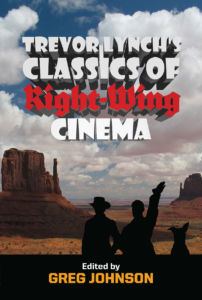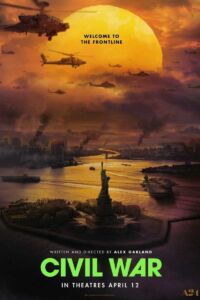Civil War
Civil War: based or cringe? That is the million-dollar question.
Your gut tells you that because it is a Hollywood film, it will be an evil MAGAs versus virtuous libtards cringefest with lots of woke anti-white messaging. Yet, part of you holds out hope that maybe it will be unintentionally based. Jews will sometimes screw up and accidentally create Right-wing anti-heroes such as Archie Bunker or Michael Douglas’ character in Falling Down. Maybe there will be some Right-wing villain who delivers nationalist monologues that are meant to come off as ominous to normies but which sounds perfectly sensible to the red-pilled viewer.
Civil War is neither based nor cringe. Before I say what Civil War is, I should explain what it is trying to be — and before I explain that, I have to explain what Civil War goes out of its way not to be.
Civil War tries as best it can to be non-ideological. In its scenario, the United States has fractured into different factions. The East Coast and the Midwest remain loyal to the federal government, but Florida and the Northwest have broken off into separate countries, while Texas and California have formed an alliance. The causus belli for this current state of affairs is never clearly defined, however. As such, you can’t tell who are the MAGAs and who are the libtards, and so you can’t tell who the good guys and the bad guys are. There is some suggestion that the President in the movie is atypically authoritarian, although what he did to get people so riled up is not articulated, so you can’t evaluate the merits of the separatist arguments (which are never presented, anyway). Moreover, in the battle scenes you can’t tell which side is fighting whom.
Note that I said that Civil War tries the best it can to be non-ideological — which is to say, imperfectly. The two most sadistic characters in the movie both happen to have Southern accents — although to be fair, those scenes take place in the South. The most talked-about scene is one where a soldier who commits war crimes asks the heroes what state they are from before deciding whether or not to execute them. Thankfully, he is the most ideologically-defined character in the entire movie, but for the most part, the filmmakers try to keep their biases closer to their vests. The city of Charlottesville — yes, that one — is a plot device, although it’s never made clear what we’re supposed to make of that.
Rather than offering social commentary on contemporary American politics, what Civil War tries to do is simply paint a picture of what a modern American civil war might look like. Star Kirsten Dunst’s character, Lee Smith, is a battle-hardened war photojournalist whose job is to do just that: show what war looks like. Civil War is also a road trip movie, as Dunst and her multiracial group of companions — one Hispanic guy, a young girl who looks Jewish but apparently isn’t, and an elderly black man who ultimately sacrifices himself to save the other three — travel across the bombed-out American wasteland on their way to interview the soon-to-be-deposed American President. En route, they document the horrors of war: the pitched battles, the summary executions, and all the rest. Smith travels using Canadian money, as American money has hyper-inflated into worthlessness.
At one point the movie seems to pat itself on the back for being so non-ideological. The heroes get pinned down by a sniper hiding inside a mansion. They take shelter next to some soldiers who are engaged in a sniper duel with the other fellow. Journalist Joel, played by Wagner Moura, asks one of the soldiers who is inside, and more specifically, what faction he represents. This leads to the following exchange:
Joel: Hey, what’s going on?
Soldier: Someone in that house. There’s stuck. We’re stuck.
Joel: Who do you think they are?
Soldier: Mmmmm. No idea.
Joel: [Shows press pass] Hey, we’re press.
Soldier: Cool. Now I understand why it’s written on the side of your vehicle.
Joel: Are you WF [Western Forces, those fighting for the California-Texas secessionist alliance]? Who’s giving you orders?
Soldier: No one’s giving us orders, man. Someone is trying to kill us. We are trying to kill them.
Joel: You don’t know what side they are fighting for.
Soldier: Oh, I get it. You’re retarded. You don’t understand a word I say. [He turns to Jessie, Kirsten Dunst’s young photojournalist protégé.] Yo, what’s over there in that house?
Jessie: Someone shooting.

You can buy Trevor Lynch’s Classics of Right-Wing Cinema here.
The soldier turns back to Joel with an expression showing, “Even the girl gets it.”
The message is that in a civil war, it’s kill or be killed. All politics and ideology melt away in the life-or-death struggle for survival. Much mirth was made of the ridiculous in-universe premise that California and Texas, two states which couldn’t be more different ideologically, would form a political union, but if you understand what the movie is trying to do, it does make sense. The fact that it doesn’t makes sense to us is the very point, as it makes projecting ideological presumptions on the story harder to do.
In short, this movie aspires to be like The Day After: not a political manifesto, but a visual imagining of a possible future. In the 1980s, you had Cold War hawks such as Bill Buckley arguing about how a limited nuclear was totally possible and so it was felt necessary to make a movie showing what that would actually look like. Civil War was conceived in 2020 when the idea of civil war and Balkanization started being floated around by serious people. Civil War aspires to show what that would look like. As such, I will evaluate it based on what it is trying to do.
The problem is that I don’t think you can make a realistic movie about a theoretical civil war that is non-ideological, as I can’t imagine an actual civil war not being extremely politically incorrect. 90% of blacks would be on one side, there would be gender imbalances, and one side would be noticeably whiter than the other. And yet, Civil War presents a world where all sides have the same basic racial composition and all skew disproportionately white. Sure, Civil War leaves it up to your imagination as to what might have happened to have triggered a national breakdown, but even with my vast creative powers, I struggle come up with a scenario where you have two different Burger King Kid’s Clubs warring with each other.
Thankfully, there are no evil white racists acting beastly toward blacks. Interestingly, there is a montage near the beginning where we see two backs being executed by other blacks. Now, this I could believe. I can imagine that, in the anarchy of war, blacks would use the chaos to settle scores and weed out Uncle Toms.
Some have suggested that perhaps peoples of color would perceive an American civil war as essentially white-on-white infighting and just check out of the conflict, which would explain both sides being disproportionately white. Indeed, there are scenes showing refugee camps where the inhabitants are majority non-white. I don’t know the rationale, and it’s not worth spending too much time thinking about.
Civil War is a movie that it is best not to overthink. Watch it the same way you might watch a dystopian cyberpunk movie that you don’t expect to make sense. If you just sit back and try to enjoy the ride, you might find a thing or two worth enjoying in it. The movie looks good and the battle scenes are well done, including a final shootout in the White House.
There’s one scene that stuck out for me: a battered and bloody white man hanging from the roof of a bridge. The blond guard beneath tells the heroes that the man was a looter and then makes small talk about how he used to go to high school with the guy, before he proceeds to execute him. The ties of kinship that had existed have thus been completely annulled. This give me pause for thought. Would I be prepared to execute shitlib whites? Drop me off in a race war and I could fight it like a sociopath, but could I blow the brains out of a white social justice warrior? Some say that during the Second World War, SS men refused to execute “Reich Jews.” They could execute Slavic Jews all day long and then sleep like babies, but when presented with Jews that looked and talked like them, it was a different story. Thus, I’ll give the movie credit for giving me one scene that caused me to think a bit.
If Civil War is trying to say anything, that is its message: Whatever the politics behind it, war is hell, and it is particularly tragic when it is brother against brother. This isn’t the most original message, but again, the movie’s purpose is to show and not tell.




